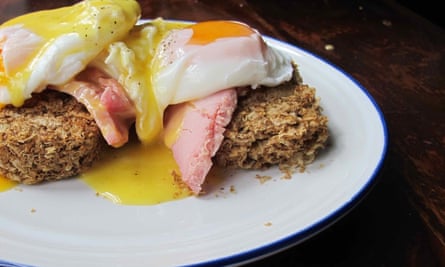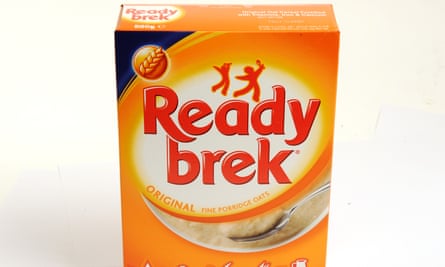UK cereal brand Weetabix is to be snapped up by the US company Post Holdings in a deal worth £1.4bn.
The breakfast cereal favourite, made in Britain since 1932, was put up for sale in January by China’s Bright Food which took a majority stake in 2012.
Weetabix is made in the small town of Burton Latimer, near Kettering, Northamptonshire, and will become part of America’s third-largest cereal company. Other brands owned by Post Holdings include Bran Flakes and Fruity Pebbles.
The Weetabix portfolio includes Alpen, the No 1 muesli brand in the UK, Ready Brek, Barbara’s and Weetos. The company employs about 1,800 people globally, with 60% of the workforce in the UK. While it has some overseas manufacturing plants, all of the wheat that goes into Weetabix biscuits is grown within 50 miles of its base in Burton Latimer.
The deal is expected to complete in the third quarter of 2017 and gives Post access to the UK market through an established brand, as well as an opportunity to find new markets for its own brands, including protein shakes and bars.
When Shanghai-based Bright Food bought Weetabix, it had hoped the cereal would become popular in China as part of a general trend towards more western eating habits. However, while sales of Weetabix have risen in China, market share has disappointed as traditional rice and steamed bread remain popular breakfast staples.

Weetabix is exported to more than 90 countries but the UK accounts for the majority of sales and the brand is a royal warrant holder. It was family-owned until 2004, when it was bought by a Texas private equity firm. It was later sold to another private equity firm, Lion Capital.
Other potential suitors interested in Weetabix were thought to have included the UK’s Associated British Foods, Cereal Partners Worldwide and Italian pasta maker Barilla.
Confirming the deal on Tuesday, Post’s president and chief executive, Rob Vitale, said: “We have long admired Weetabix as a leader in cereal and believe it will be a fantastic strategic fit within Post.

“Combining together two category leaders [Alpen] continues our strategy of strengthening our portfolio in stable categories and diversifying into new markets, bringing much-loved brands to significantly more customers globally. We are excited about the growth opportunities that this acquisition brings.”
Post, founded in 1895 and based in St Louis, Missouri, said it had agreed to establish a joint venture with Bright Food and an investment fund advised by Baring Private Equity Asia to manage the Weetabix China operations.
Giles Turrell, chief executive of Weetabix, said its new owners would help the company to grow. “The past five years have seen us increase our branded sales at home and overseas. I’m confident [Post] will help us open doors for continued expansion.”
Turrell will take on the new role of chairman of Weetabix and will be responsible for managing the integration of the two companies. Sally Abbott, currently director of marketing at Weetabix, will become managing director of Weetabix UK and Ireland.
Turrell said job cuts were not expected in the UK and that its new owners would allow the business to grow.
“Post has no footprint or manufacturing in the UK,” he said. “As long as we remain successful in the marketplace we will continue to manufacture at our plants here in Northamptonshire.”
Unite, the UK’s largest union, said it had requested an urgent meeting with the new owner of Weetabix to gain assurances on jobs. Unite represents more than 110 workers, including engineering and technical staff, at Weetabix’s UK plants in Burton Latimer and Corby.
“We want to work constructively with the new management team to ensure the success of the iconic Weetabix brand and to safeguard the future employment for our hardworking and dedicated members,” said Sally Mortimer, regional officer for Unite.
George Salmon, equity analyst at Hargreaves Lansdown, said the proposed deal was the latest in a string of approaches for UK companies since the Brexit vote last June and the subsequent sharp fall in the pound.
“The deal comes hot on the heels of Kraft Heinz’s bid for Unilever and 21st Century Fox’s approach for Sky, and further transatlantic deals may be flushed out by the strong dollar and rising US interest rates.
“Weetabix has struggled to crack the Chinese market, so it is no surprise to see Bright Food selling up. It’s also unsurprising to see one of the UK’s biggest cereal brands remain in foreign ownership, due to the pound’s weakness.”
Post has annual revenues of $5bn(£4bn) expects to make annual savings of about £20m a year before the third full year after completion of the deal, from shared administration and infrastructure among other things. It estimates that Weetabix will contribute about £120m of adjusted earnings before interest, tax, depreciation and amortisation, excluding cost savings. Weetabix’s revenue was about £410m in 2016.
Beyond the UK, Weetabix has operations in North America, South Africa, Germany and Spain, and it is the majority owner of a joint venture in Kenya that serves the African market. The UK and Ireland remain its biggest market, followed by North America and China.











Comments (…)
Sign in or create your Guardian account to join the discussion